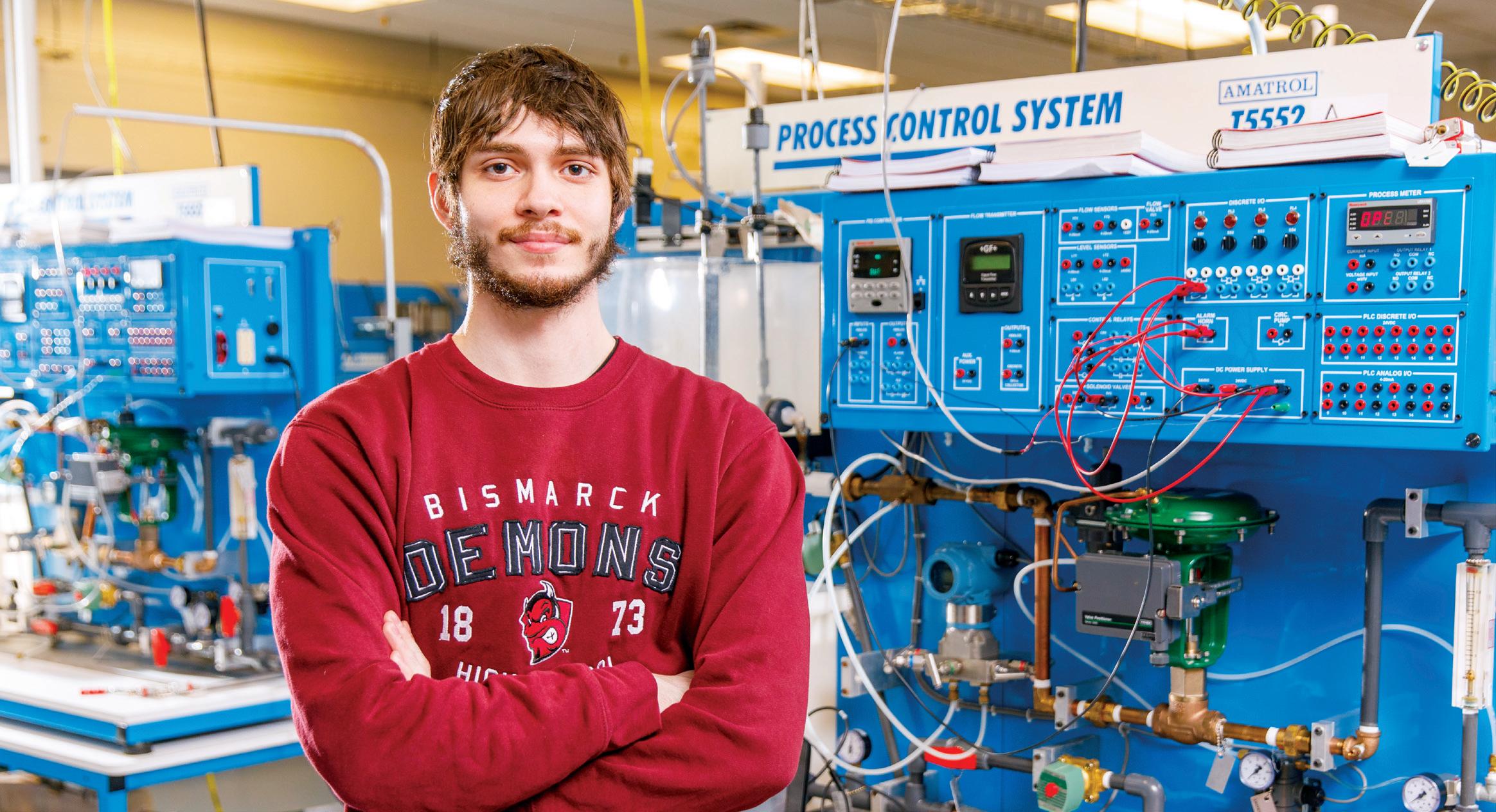
4 minute read
ELECTRONICS CERTIFICATE
BSC Instrumentation and Control Technology graduate Tate Beckler ('20) completed his fi rst year of the program while still in high school.
OPENS QUICK CAREER PATHS
By Kamryn Hellman
Tate Beckler’s path to becoming an electrical control technician
at American Crystal Sugar started in high school, when he took an electronics course offered through the Bismarck Public School (BPS) Career Academy.
“Most of my friends were interested and signed up, so I followed the group,” Beckler remembers. “I actually had very little interest at fi rst.” But when his instructor mentioned that taking electronics for three years in high school would allow him to skip a full year of college at Bismarck State College, his interest was piqued. “That sounded like a really great opportunity for me.”
BSC and BPS offer students the opportunity to earn up to 28 college credits while still in high school. Completing these electronics courses and applying them towards an Instrumentation & Control (I&C) Technology degree or an Electronics/Telecommunications Technology degree can save students thousands of dollars and allow them to spend less time in college before entering the workforce.
In high school electronics classes, students learn electronics theory and apply their knowledge in labs, where they analyze, build, design and troubleshoot basic circuits. By their third year, students are able to install and program computer networks, home theater systems, security systems and microprocessors, working on projects both on and off campus.
“High school students use the same labs and equipment as our students do at BSC,” says Mike Holman, BSC associate professor of electronics. “They are familiar with the procedures when they make the transition to college.”
And he enjoyed every minute. “My experience was fantastic. There was something new basically every day. Vance Vesey and Scott Harris both have ways of making even the most boring subjects seem interesting,” Beckler says.
BSC Associate Professor of Instrumentation and Control Technology Vance Vesey enjoys working with students like Beckler, too. He admires the ambition of students who start working on their degree in high school. “I see so much potential and drive in these students. They work hard and have ambitious goals. It is truly an honor to work with our next generation of technicians!”
Vesey says one thing that attracts students to the Instrumentation and Control Technology program is the wide variety of career opportunities for graduates. Industries such as food and beverage, energy, water treatment and pharmaceuticals are looking for workers with an electronics or process background. “Anywhere raw materials are brought together to make a fi nal product, people are needed to maintain the machines that run these processes,” Vesey says.
Students who take the telecommunications path have a lot of options, too. “When students complete the second year of our program, they are ready for an entrylevel position in telecommunications or several other fi elds,” says Holman. Many regional companies recruit graduates every year. These types of companies include aviation, radio and TV broadcast, power and parts distribution, video surveillance, security, manufacturing and rural telecommunications.
Beckler found his electronics career path quickly. “The position I currently hold, an electrical control technician at American Crystal Sugar, was offered to me in May of 2020, before I even graduated,” he says.
He partially attributes his career opportunity to lucky timing, but said it speaks to the demand for people with an educational background like his. “The company needed technicians and didn’t mind too much about past work experience.”
Beckler says he gained a lot of experience during his electronics courses and his time at BSC, but the most important thing he learned was how to keep up with a constantly evolving fi eld.
Tate Beckler, Bismarck State College Alum ('20)
“Anyone can be trained to go and fi x something, but Scott and Vance did a great job of explaining why everything worked.” He says that knowing the reasons things worked gave him a big advantage over others just entering the fi eld. Asking those questions helped him learn to troubleshoot issues he encounters at work, even ones he’s never seen before.
Students like Beckler tend to ask different questions. “The high school students bring a new perspective to our program that is different from the students that take the fi rst year at the college level,” Holman says. “They see things slightly different.”
Beckler remembers his experience in the program fondly. “Nothing has compared to it before or since those classes. They were truly some of the best memories of my life.”
For more information about earning college credit while still in high school, visit bismarckstate.edu/fasttrack.
For a list of programs offered at BSC, including Instrumentation & Control Technology, and Electronics/ Telecommunications Technology, go to bismarckstate.edu/programs.
THE POLYTECHNIC ADVANTAGE
FLEXIBLE. AFFORDABLE. TRANSFERABLE. K-12 PATHWAY


MIDDLE SCHOOL/ ELEMENTARY SCHOOL ELEMENTARY SCHOOL
ENTRY LEVEL TECHNICIAN SPECIALIST/ OPERATOR SUPERVISOR/ INDUSTRY LEADER
HIGH SCHOOL
BISMARCK STATE COLLEGE
General Education Courses Industry Certification Associate in Arts Associate in Science Associate in Applied Science









